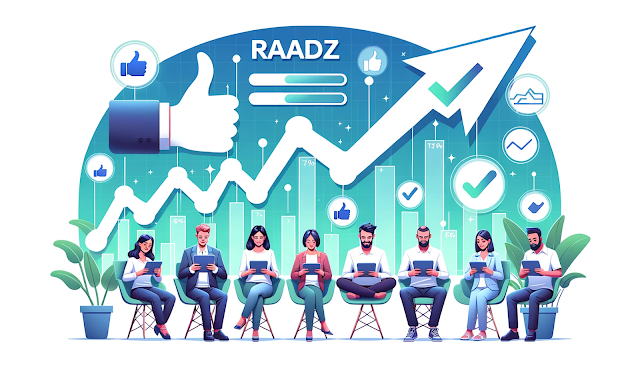Elevating Market Research: A Comparison between RAADZ and Traditional Survey Methods
At RAADZ, we recognize the timeless value of traditional market research in capturing authentic sentiments and insights. Over the years, these methods have consistently provided invaluable quantitative and qualitative data. Yet, as the landscape evolves, we've introduced an exciting alternative to the mix. With our unique blend of patented technology and gamification, we believe RAADZ stands at the forefront of next-generation market research. In this piece, we'll compare our innovative approach with time-tested survey methods to showcase the benefits and advancements we bring to the table.
RAADZ at a Glance
Before diving into the comparison, let's quickly recap RAADZ's unique methodology:
Gamified Approach: Drawing inspiration from the Family Feud game show, RAADZ turns survey-taking into an engaging experience where participants predict average answers.
Diminishing Fears: This mechanism sidesteps potential fears of backlash or societal 'canceling,' facilitating more genuine responses.
Leveraging Psychological Concepts: Courtesy of the False Consensus Effect, respondents, while attempting to predict averages, inadvertently express their candid opinions.
Diverse Question Types: RAADZ employs slider scale, Likert scale, and open-ended questions, harnessing AI to process and report on the answers. This offers a blend of quantitative and qualitative insights.
Countering Survey Limitations: The platform proactively addresses several pitfalls of traditional surveys—boosted response rates through rewards, reduced biases, and an environment fostering honest feedback on sensitive subjects.
Traditional Survey Methods
Traditional surveys have long been the go-to means for collecting data. They encompass a range of methods:
Paper Surveys: Often mailed or handed out, they're a tangible way to collect responses.
Online Surveys: Digital surveys distributed via email or websites.
Telephone Surveys: Direct calls to participants for responses.
Face-to-face Interviews: One-on-one interviews for in-depth qualitative insights.
Comparing RAADZ with Traditional Methods
When dissecting the contrasts and comparisons between RAADZ and it's more conventional counterparts, several factors emerge that spotlight the distinctiveness of each:
Engagement Levels:
Traditional Surveys: Depending on their format, traditional surveys can vary in engagement. Paper surveys might be overlooked or discarded, online surveys can be closed midway if they're too lengthy or if the user loses interest, and face-to-face interviews, while engaging, can be time-consuming.
RAADZ: The gamified nature of RAADZ is its USP. It turns the routine act of answering questions into a challenge, prompting respondents to stay engaged as they try to predict average answers, making the entire process less monotonous.
Honesty and Bias:
Traditional Surveys: The inherent structure of some traditional surveys might inadvertently encourage biased responses. Participants might lean towards answers they believe are socially acceptable, especially in face-to-face interviews.
RAADZ: The platform’s design, which encourages predicting the average response, cleverly navigates around this problem. The environment fosters a sense of detachment from one's answer, allowing for more honesty and reducing potential biases.
Response Rates:
Traditional Surveys: The response rates can be hit or miss. For instance, online surveys often suffer from low open and completion rates, primarily if not incentivized.
RAADZ: With its inherent reward system and engaging format, RAADZ has the potential to significantly increase participation and completion rates.
Data Diversity:
Traditional Surveys: These can sometimes inadvertently target or attract a niche demographic, especially if distribution channels are limited. This can result in self-selection bias.
RAADZ: The platform's universal appeal, thanks to its gamified approach, ensures participation across diverse demographics, ensuring a more balanced dataset.
Flexibility in Data Collection:
Traditional Surveys: They often specialize in either quantitative or qualitative data. While some digital platforms allow for a mix, they might not offer the depth that some research requires.
RAADZ: By offering slider scale, Likert scale, and open-ended questions, coupled with AI-powered analysis, RAADZ provides researchers with rich quantitative and qualitative insights, all within one platform.
Feedback on Sensitive Topics:
Traditional Surveys: Participants can sometimes be guarded when addressing sensitive issues, fearing judgment or backlash, especially in identifiable surveys or interviews.
RAADZ: The structure of RAADZ, where respondents feel they're predicting rather than stating personal views, creates a buffer. This sense of detachment and the platform's design, which diminishes fear of societal judgment, fosters an environment conducive to candid feedback on sensitive subjects.
The Verdict
While traditional survey methods have their merits and will continue to be useful in various contexts, RAADZ's innovative approach addresses many of their limitations. By incorporating gamification, leveraging psychological principles, and harnessing the power of AI, RAADZ emerges as a formidable tool in modern market research.
For those seeking comprehensive, genuine, and engaging feedback, RAADZ might just be the future of market research.



Comments
Post a Comment